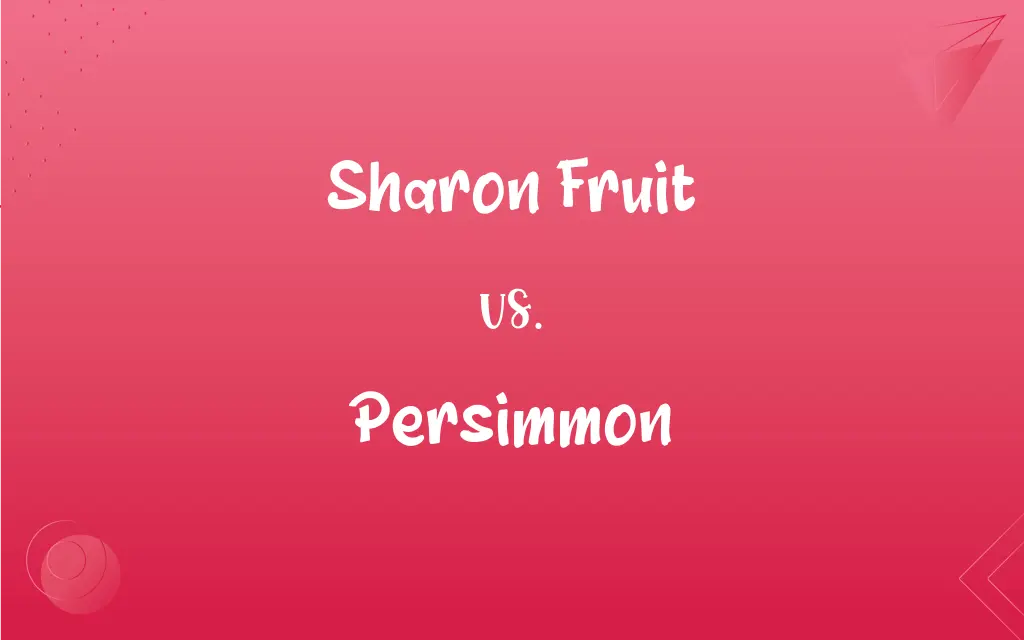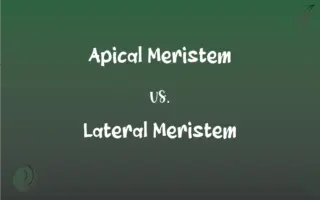Sharon Fruit vs. Persimmon: What's the Difference?
Edited by Janet White || By Harlon Moss || Updated on October 13, 2023
Sharon fruit is a type of persimmon bred for its lack of seeds and bitterness; persimmons are a fruit genus with various types, some of which are astringent when unripe.

Key Differences
Sharon fruit and persimmon both belong to the same family and genus, Diospyros, yet have distinctions in terms of culinary use and botanical characteristics. Sharon fruit is essentially a type of persimmon, specifically, the Israeli-bred variant of the Japanese persimmon, Diospyros kaki. It's renowned for its lack of astringency and seeds, offering a sweet, palatable flavor even when not fully ripe. Meanwhile, persimmons encompass a wider array of fruit types within the genus, with varied flavors, textures, and ripening requirements.
Sharon fruit, with its straightforward, user-friendly nature - no seeds and no waiting for ripeness, provides a consistently sweet, edible fruit that requires little knowledge or preparation to enjoy. On the flip side, persimmons in a broader context may necessitate specific knowledge about their variety. Some persimmons, like the Hachiya, require patience to fully ripen and lose their astringency, while others, like the Fuyu, can be eaten while still firm, akin to the Sharon fruit.
In culinary contexts, Sharon fruit finds itself being leveraged for its reliable sweetness and non-astringent properties across various stages of ripeness. In contrast, diverse persimmon types are utilized in numerous ways in cooking and eating, depending on their individual ripening characteristics and flavor profiles. Some persimmons become sweeter and lose astringency upon ripening, while others maintain a certain level of astringency and are often used in cooking.
Geographically and culturally, Sharon fruit is often associated with Israeli agricultural development, although it is appreciated globally. Persimmons are widespread, cultivated and enjoyed in many parts of the world, including Asia, North America, and Europe, each region harboring a particular affinity for different varieties, incorporating them into local cuisines in unique ways.
To wrap up, while Sharon fruit and persimmons might intersect in certain aspects due to their botanical relatedness, their distinctions lie in their specific varietal characteristics, culinary applications, and geographical/cultural significances. One, a specific, user-friendly variant, and the other, a diverse, varied genus providing a spectrum of flavors and uses.
ADVERTISEMENT
Comparison Chart
Astringency
Non-astringent even when not fully ripe
Varies, some are astringent when unripe
Seeds
Seedless
Varies; some have seeds, others do not
Geographical Association
Often associated with Israel
Cultivated and enjoyed worldwide
Culinary Use
Direct consumption, no waiting
Varies; some must ripen, others can be cooked
Varieties
One specific type
Encompasses numerous varieties
ADVERTISEMENT
Sharon Fruit and Persimmon Definitions
Sharon Fruit
Sharon fruit is non-astringent, ensuring a palatable fruit even when not fully ripe.
Sharon fruit can be enjoyed without waiting for it to become completely soft.
Persimmon
Persimmon is a fruit from the genus Diospyros, known for its sweet, sometimes astringent flavor.
The persimmon needs to fully ripen before it loses its astringency.
Sharon Fruit
Sharon fruit is a variant of persimmon, known for its sweetness at all stages of ripeness.
Sharon fruit can be eaten like an apple, without peeling.
Persimmon
Persimmons can be consumed in various forms, such as fresh, dried, or cooked.
Dried persimmon is a popular snack in several Asian countries.
Sharon Fruit
Sharon fruit often finds utilization in various culinary contexts due to its reliable sweetness.
Sharon fruit is often used in desserts for its consistent sweet flavor.
Persimmon
Persimmon trees, belonging to the family Ebenaceae, are deciduous and can be recognized by their brightly colored fruit in fall.
The persimmon tree in the backyard becomes a visual highlight in the autumn months.
Sharon Fruit
Sharon fruit is botanically a type of persimmon but is notably different in flavor and usage.
Unlike some persimmons, Sharon fruit does not need to be overly ripe to avoid astringency.
Persimmon
Persimmons may be categorized as astringent or non-astringent based on their edible stage.
This variety of persimmon is astringent and should be eaten when completely soft.
Sharon Fruit
Sharon fruit is typically seedless, offering ease in consumption.
The absence of seeds in Sharon fruit makes it convenient for making fruit salads.
Persimmon
Persimmons are rich in nutrients, offering a range of health benefits and are utilized in various culinary applications.
Persimmon pudding is a classic dessert enjoyed in some parts of the United States.
Persimmon
Any of various chiefly tropical trees of the genus Diospyros, having hard wood and orange-red fruit with sweet usually soft pulp, especially D. kaki, native to East Asia, and D. virginiana, native to the eastern United States.
Persimmon
The fruit of any of these trees.
Persimmon
A type of fruit, of orange colour, very sweet, quite astringent when immature.
Persimmon
The tree this fruit grows on, generally one of two species of ebony: Diospyros kaki (Asian) or Diospyros virginiana (North American).
Persimmon
An American tree (Diospyros Virginiana) and its fruit, found from New York southward. The fruit is like a plum in appearance, but is very harsh and astringent until it has been exposed to frost, when it becomes palatable and nutritious.
Persimmon
Any of several tropical trees of the genus Diospyros
Persimmon
Orange fruit resembling a plum; edible when fully ripe
FAQs
Can Sharon fruit be eaten unpeeled?
Yes, Sharon fruit can be eaten unpeeled.
What is a Sharon fruit?
Sharon fruit is a type of persimmon that is sweet and non-astringent even when not fully ripe.
Are persimmons always astringent when unripe?
Some persimmons are astringent when unripe, while others, like the Fuyu, are not.
How can astringent persimmons be used in cooking?
Astringent persimmons are often used in baking or cooking once fully ripened and sweet.
Where did Sharon fruit originate?
Sharon fruit originated in Israel, hence the name derived from the Sharon plain.
How do you know when a persimmon is ripe?
Persimmons may soften and change color, typically becoming deep orange, when ripe.
Is Sharon fruit used in traditional dishes?
Sharon fruit may be used in various dishes but isn’t specifically tied to traditional ones.
What is the primary difference between Sharon fruit and persimmon?
Sharon fruit is a specific type of persimmon that is non-astringent and usually seedless.
Are all persimmons seedless like Sharon fruit?
No, some persimmons contain seeds, unlike the typically seedless Sharon fruit.
When is the persimmon season?
Persimmon season typically runs from autumn to early winter.
Can you freeze Sharon fruit?
Yes, Sharon fruit can be frozen and enjoyed later.
Can persimmons be used in savory dishes?
Yes, persimmons can be used in a variety of savory dishes when ripe.
Are persimmons and Sharon fruit expensive?
The price of persimmons and Sharon fruit may vary based on the region and season.
Are persimmons good for your health?
Yes, persimmons are rich in nutrients like vitamins A and C, and fiber.
Are persimmons related to tomatoes?
No, despite a somewhat similar appearance, persimmons are not related to tomatoes.
Is Sharon fruit available worldwide?
Yes, Sharon fruit is available in various parts of the world.
Can you dry Sharon fruit like other persimmons?
Yes, Sharon fruit can also be dried and enjoyed as a snack.
Can you make jam with Sharon fruit?
Yes, Sharon fruit can be made into jam due to its sweet, non-astringent nature.
Can persimmon leaves be used in cooking?
Yes, persimmon leaves can be used for making tea and are also used in some culinary applications.
Are Sharon fruit and persimmons safe for all to eat?
Generally, yes, but as with any food, some individuals might have allergies or intolerances to Sharon fruit or persimmons.
About Author
Written by
Harlon MossHarlon is a seasoned quality moderator and accomplished content writer for Difference Wiki. An alumnus of the prestigious University of California, he earned his degree in Computer Science. Leveraging his academic background, Harlon brings a meticulous and informed perspective to his work, ensuring content accuracy and excellence.
Edited by
Janet WhiteJanet White has been an esteemed writer and blogger for Difference Wiki. Holding a Master's degree in Science and Medical Journalism from the prestigious Boston University, she has consistently demonstrated her expertise and passion for her field. When she's not immersed in her work, Janet relishes her time exercising, delving into a good book, and cherishing moments with friends and family.
































































